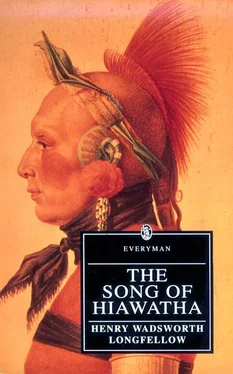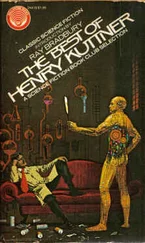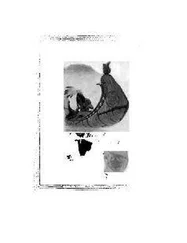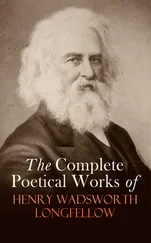Then the Black-Robe chief, the Prophet,
Told his message to the people,
Told the purport of his mission,
Told them of the Virgin Mary,
And her blessed Son, the Saviour,
How in distant lands and ages
He had lived on earth as we do;
How he fasted, prayed, and labored;
How the Jews, the tribe accursed,
Mocked him, scourged him, crucified him;
How he rose from where they laid him,
Walked again with his disciples,
And ascended into heaven.
And the chiefs made answer, saying:
"We have listened to your message,
We have heard your words of wisdom,
We will think on what you tell us.
It is well for us, O brothers,
That you come so far to see us!"
Then they rose up and departed
Each one homeward to his wigwam,
To the young men and the women
Told the story of the strangers
Whom the Master of Life had sent them
From the shining land of Wabun.
Heavy with the heat and silence
Grew the afternoon of Summer;
With a drowsy sound the forest
Whispered round the sultry wigwam,
With a sound of sleep the water
Rippled on the beach below it;
From the cornfields shrill and ceaseless
Sang the grasshopper, Pah-puk-keena;
And the guests of Hiawatha,
Weary with the heat of Summer,
Slumbered in the sultry wigwam.
Slowly o'er the simmering landscape
Fell the evening's dusk and coolness,
And the long and level sunbeams
Shot their spears into the forest,
Breaking through its shields of shadow,
Rushed into each secret ambush,
Searched each thicket, dingle, hollow;
Still the guests of Hiawatha
Slumbered In the silent wigwam.
From his place rose Hiawatha,
Bade farewell to old Nokomis,
Spake in whispers, spake in this wise,
Did not wake the guests, that slumbered.
"I am going, O Nokomis,
On a long and distant journey,
To the portals of the Sunset.
To the regions of the home-wind,
Of the Northwest-Wind, Keewaydin.
But these guests I leave behind me,
In your watch and ward I leave them;
See that never harm comes near them,
See that never fear molests them,
Never danger nor suspicion,
Never want of food or shelter,
In the lodge of Hiawatha!"
Forth into the village went he,
Bade farewell to all the warriors,
Bade farewell to all the young men,
Spake persuading, spake in this wise:
"I am going, O my people,
On a long and distant journey;
Many moons and many winters
Will have come, and will have vanished,
Ere I come again to see you.
But my guests I leave behind me;
Listen to their words of wisdom,
Listen to the truth they tell you,
For the Master of Life has sent them
From the land of light and morning!"
On the shore stood Hiawatha,
Turned and waved his hand at parting;
On the clear and luminous water
Launched his birch canoe for sailing,
From the pebbles of the margin
Shoved it forth into the water;
Whispered to it, "Westward! westward!"
And with speed it darted forward.
And the evening sun descending
Set the clouds on fire with redness,
Burned the broad sky, like a prairie,
Left upon the level water
One long track and trail of splendor,
Down whose stream, as down a river,
Westward, westward Hiawatha
Sailed into the fiery sunset,
Sailed into the purple vapors,
Sailed into the dusk of evening:
And the people from the margin
Watched him floating, rising, sinking,
Till the birch canoe seemed lifted
High into that sea of splendor,
Till it sank into the vapors
Like the new moon slowly, slowly
Sinking in the purple distance.
And they said, "Farewell forever!"
Said, "Farewell, O Hiawatha!"
And the forests, dark and lonely,
Moved through all their depths of darkness,
Sighed, "Farewell, O Hiawatha!"
And the waves upon the margin
Rising, rippling on the pebbles,
Sobbed, "Farewell, O Hiawatha!"
And the heron, the Shuh-shuh-gah,
From her haunts among the fen-lands,
Screamed, "Farewell, O Hiawatha!"
Thus departed Hiawatha,
Hiawatha the Beloved,
In the glory of the sunset,
In the purple mists of evening,
To the regions of the home-wind,
Of the Northwest-Wind, Keewaydin,
To the Islands of the Blessed,
To the Kingdom of Ponemah,
To the Land of the Hereafter!
The End
Adjidau'mo, the red squirrel
Ahdeek', the reindeer
Ahmeek', the beaver
Annemee'kee, the thunder
Apuk'wa. a bulrush
Baim-wa'wa, the sound of the thunder
Bemah'gut, the grape-vine
Chemaun', a birch canoe
Chetowaik', the plover
Chibia'bos, a musician; friend of Hiawatha;
ruler of the Land of Spirits
Dahin'da, the bull frog
Dush-kwo-ne'-she or Kwo-ne'-she,
the dragon fly
Esa, shame upon you
Ewa-yea', lullaby
Gitche Gu'mee, The Big-Sea-Water,
Lake Superior
Gitche Man'ito, the Great Spirit,
the Master of Life
Gushkewau', the darkness
Hiawa'tha, the Prophet. the Teacher,
son of Mudjekeewis, the West-Wind and Wenonah,
daughter of Nokomis
Ia'goo, a great boaster and story-teller
Inin'ewug, men, or pawns in the Game of the Bowl
Ishkoodah', fire, a comet
Jee'bi, a ghost, a spirit
Joss'akeed, a prophet
Kabibonok'ka, the North-Wind
Ka'go, do not
Kahgahgee', the raven
Kaw, no
Kaween', no indeed
Kayoshk', the sea-gull
Kee'go, a fish
Keeway'din, the Northwest wind, the Home-wind
Kena'beek, a serpent
Keneu', the great war-eagle
Keno'zha, the pickerel
Ko'ko-ko'ho, the owl
Kuntasoo', the Game of Plumstones
Kwa'sind, the Strong Man
Kwo-ne'-she, or Dush-kwo-ne'-she, the dragon-fly
Mahnahbe'zee, the swan
Mahng, the loon
Mahnomo'nee, wild rice
Ma'ma, the woodpecker
Me'da, a medicine-man
Meenah'ga, the blueberry
Megissog'won, the great Pearl-Feather,
a magician, and the Manito of Wealth
Meshinau'wa, a pipe-bearer
Minjekah'wun, Hiawatha's mittens
Minneha'ha, Laughing Water; wife of Hiawatha;
a water-fall in a stream running into the
Mississippi between Fort Snelling and the
Falls of St. Anthony
Minne-wa'wa, a pleasant sound, as of the wind
in the trees
Mishe-Mo'kwa, the Great Bear
Mishe-Nah'ma, the Great Sturgeon
Miskodeed', the Spring-Beauty, the Claytonia Virginica
Monda'min, Indian corn
Moon of Bright Nights, April
Moon of Leaves, May
Moon of Strawberries, June
Moon of the Falling Leaves, September
Moon of Snow-shoes, November
Mudjekee'wis, the West-Wind; father of Hiawatha
Mudway-aush'ka, sound of waves on a shore
Mushkoda'sa, the grouse
Nah'ma, the sturgeon
Nah'ma-wusk, spearmint
Na'gow Wudj'oo, the Sand Dunes of Lake Superior
Nee-ba-naw'-baigs, water-spirits
Nenemoo'sha, sweetheart
Nepah'win, sleep
Noko'mis, a grandmother, mother of Wenonah
No'sa, my father
Nush'ka, look! look!
Odah'min, the strawberry
Okahha'wis, the fresh-water herring
Ome'mee, the pigeon
Ona'gon, a bowl
Opechee', the robin
Osse'o, Son of the Evening Star
Owais'sa, the blue-bird
Oweenee', wife of Osseo
Ozawa'beek, a round piece of brass or copper
in the Game of the Bowl
Pah-puk-kee'na, the grasshopper
Читать дальше












